The one who loved three things on "K":horses, cognac and, of course, women, and valued the honor of the Polish army more than his own. The first freak of the brightest Second Polish Republic was the hero of many scandals. The biggest one broke out in 1939. Bolesław Wieniawa-Długoszowski was elected president for real!
The September campaign did not go according to the Poles' wishes. In the face of an attack from both sides and the overwhelming advantage of the enemy, the highest authorities of the Republic of Poland evacuated to Romania. There, Polish dignitaries met quite a surprise. Romanian authorities - under pressure from the Germans - interned newcomers from a friendly country.
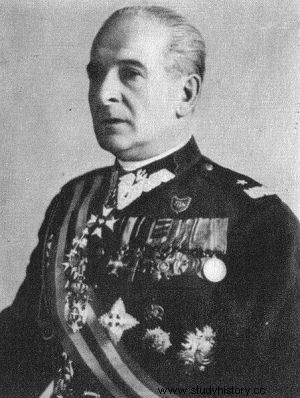
A settled diplomat, General Wieniawa-Długoszowski.
In this situation, President Ignacy Mościcki was no longer able to fulfill his duties, as the sovereignty of the Polish government could be violated. The only option was to appoint a successor. Fortunately, the constitution provided for such an eventuality. Article 24 entitled the incumbent president, in the event of his inability to perform his duties, to appoint a successor himself.
Maintain continuity of power
Ignacy Mościcki had previously tried to secure the appointment of the highest position in the country, but appointed by him by a decree of September 1, 1939, Śmigły-Rydz was also interned in Romania. In order to maintain the continuity of power, it was necessary to look for another candidate. One of the dignitaries suggested that the best successor would be one of the ambassadors still in the posts. Someone known and influenced abroad.
After considering all the pros and cons, it was ... Bolesław Wieniawa-Długoszowski. Yes, the same one that all the ladies of dubious reputation used to sigh for, who was portrayed in the newspapers by caricaturists and known by all bartenders and innkeepers from Praga to Ochota.
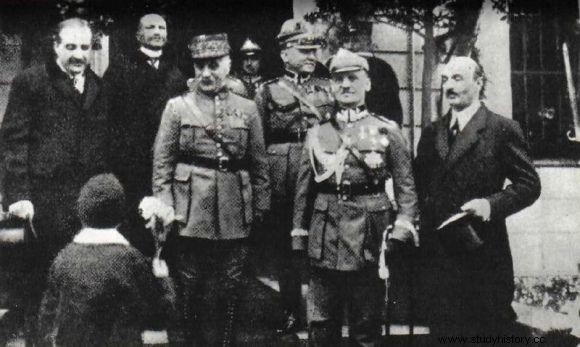
Sikorski had been fraternizing with the French for a long time, no wonder that they preferred to support him. The photo shows Marshal Ferdinand Foch and General Władysław Sikorski in Warsaw in 1923.
But it was no longer the same lancer as it used to be. After taking over the diplomatic post in Rome in 1938, he became a bit more serious, stopped drinking so much (on Beck's advice, not to let the Italians drink his guests in a bottle, he drank himself tea) and fulfilled himself as a husband and father.
Considering the international situation at the time, Wieniawa-Długoszowski seemed to be a really good candidate. As the Polish ambassador, he made friends with Italian politicians, including the Minister of Foreign Affairs and the son-in-law of Mussolini Galeazzo Ciano. He knew a total of eight languages (apart from Greek and Latin six modern ones) and most importantly - he was free and could go to France at any moment, where the new Polish government in exile was to reside.
"Ask Wieniawa to take care of the Koneckies"
In the meantime, a special cipher was invented using the name of the Konecki family, accompanying Mościcki. Several different inquiries and information about them were given special meaning, after all, writing about other internees did not raise any suspicions. Overall, everything with regard to the designation of Wieniawa seemed to be sorted out. Suddenly, the old animosities between Piłsudski's people and the rest of the political scene came to the fore.
Wieniawa-Długoszowski was on a straight path to assuming the presidency and was already starting to accept candidates for individual positions in the government, and Mrs. Bolesławowa was making preparations for the move to Paris when Władysław Sikorski entered the stage. When the general arrived in the French capital, it was clear that he did not intend to passively watch the Piłsudians take over power once again. He wanted to arrange things his own way.
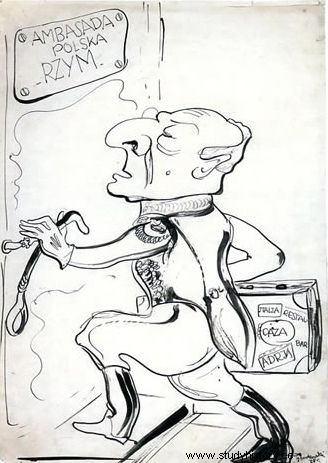
Wieniawa was often the main character of anecdotes, and caricaturists adored him. Well, it didn't help him to shape his image as a statesman.
As everything was supposed to happen in Paris, Sikorski was definitely favored by circumstances. He was a famous Francophile, he studied on the Seine at the École Supérieure de Guerre and had considerable influence in French government spheres, which made him in a much better situation than Wieniawa. Upon learning of Długoszowski's nomination, he immediately began to act.
He did not have to search for a long time, it was enough to announce the old excesses of the then almost sixty-year-old general. Moreover, began to argue to all and sundry that the nomination itself was downright a disaster because the first uhlan of the Second Polish Republic, even to take the presidency, came flooded.
To meddle in your business like that!
Although theoretically it was a matter solely within the competence of the Polish government, the French and English governments began to interfere with everything, unlawfully interfering with the ally's decision. The French deputy minister for foreign affairs, who unreservedly accepted Wieniawa's nomination in the morning, announced at noon that he considered her extremely unhappy.
On the same day, at a meeting of the French Council of Ministers, information was released that the president of Poland is to be some unknown general, alcoholic and terrible reveler (Sikorski took care of such and not only such PR). In an official statement to Mościcki, the French stated that Wieniawa as president would not recognize or support his government.
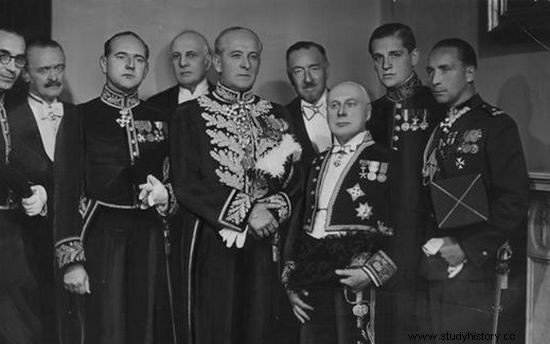
Władysław Sikorski's strenuous efforts meant that the French ultimately did not agree to Wieniawa's candidacy for president. The photo shows Wieniawa in a diplomatic uniform (standing in the middle).
It turned out, therefore, that our beloved ally decided to decide for the sovereign president and to arrange things in his own way. The Poles in Romania, however, had no option - in the critical situation that prevailed after the September campaign, they had to bend.
The military attache at the Polish embassy in Rome, Marian Romeyko, claimed that Długoszowski "presided over" for about two days, but he was wrong. Wieniawa acted honorably in this whole affair. Not wanting to complicate Mościcki's position even further, he did not take the presidential oath at all. 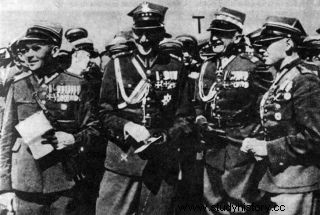
Instead, he sent a telegram to the president asking for his release from honorable duty. Besides, no one knew that Wieniawa was nominated under strict conditions. Knowing his honor, Mościcki made the general promise that he would resign from office if a better candidate was found.
Opinions on the would-be presidency of Bolesław Wieniawa-Długoszowski were and are divided. As Sławomir Koper writes in his book "Polish hell", it caused consternation among emigration politicians and aroused considerable controversy. Because although the drunken escapades of a well-known romp in the capital of Poland and the return home in three carriages at the same time were a thing of the past, Wieniawa was still Wieniawa ...
